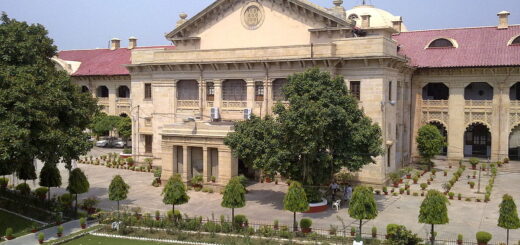The Supreme Court stated that the legislature’s power to make rules cannot be canceled by the idea of ‘functus officio.’

The Supreme Court stated that the legislature’s power to make rules cannot be limited or canceled by the idea of ‘functus officio’. This statement was made during a series of Civil Appeals against a decision by the Telangana High Court, which had annulled a Government Office Memorandum (GOM) from Andhra Pradesh. The two-Judge Bench, consisting of Justice P.S. Narasimha and Justice Sandeep Mehta, emphasized that the rule-making power of the legislature is not subject to the concept of functus officio. They explained that this principle typically applies to judicial or quasi-judicial bodies and does not pertain to the rule-making authority of the State Government as outlined in Article 245 of the Indian Constitution. The Bench further noted that applying the doctrine of ‘functus officio’ to administrative decision-making or rule-making would severely restrict the executive power, leaving the State unable to modify or reverse any policies, effectively halting its operations.
Senior Advocates Gaurav Agarwal, B. Adinarayana Rao, and Guru Krishnakumar represented the Appellants, while Advocate K. Lakshmi Narsimha represented the Respondents. The Appellants, who have a B. Tech (Bachelor of Technology) degree, were chosen and appointed as Work Inspectors in the Andhra Pradesh Scheduled Castes Cooperative Development Corporation in 1990, where they worked in that department. The State Government released a GOM to approve the creation of Assistant Executive Engineer (AEE) positions for the Phase-II of the Andhra Pradesh Primary School Project, which started in 1983 with support from the Government of the United Kingdom. This project had a strict timeline, so the State instructed the Chief Engineer to quickly fill the positions using the list from the Andhra Pradesh Public Service Commission (APPSC). If that list was not sufficient, the Chief Engineer could also hire candidates from the employment exchange. Since the APPSC list did not have enough candidates for the project, the Chief Engineer contacted the State Government. In response, the Panchayat Raj and Rural Development Department issued a GOM allowing the vacancies to be filled by Work Inspectors, Draughtsmen, or Tracers already working in the Panchayat Raj Department who held an Engineering degree, such as B.E. or B. Tech.
A new Government Order (GOM) was later issued by the Department, approving 386 Assistant Executive Engineer (AEE) positions under the Cyclone Emergency Reconstruction Project (CERP). The Appellants, who were already working as Work Inspectors, were appointed as temporary AEEs in 1992. In 1994, the Andhra Pradesh (Regulation of Appointments to Public Services and Rationalization of Staff Pattern and Pay Structure) Act was passed to improve the recruitment process. This led to the creation of 729 AEE positions, prompting Technical Grade-I Inspectors to file an Original Application with the Andhra Pradesh Administrative Tribunal (APAT) to have their cases considered for AEE appointments. The APAT instructed the State to review the Work Inspectors’ cases, resulting in another GOM to fill AEE vacancies. A notification for appointments was issued in 1995, and the Respondents were selected and appointed in 1997.
Dissatisfied with the lack of consideration for their regularization, the temporary AEEs went to APAT, which ordered the State to make a decision. The State, however, denied their request for regularization, leading the temporary AEEs to approach APAT again. During the process, the State regularized their services. While they were pleased with the regularization, they were unhappy about the denial of seniority. The Appellants submitted several requests to the State Government, which were accepted. Consequently, the Respondents took their case to APAT, but their applications were dismissed. The matter was then brought to the High Court, which ruled in favor of the Respondents, prompting the Appellants to challenge this decision in the Supreme Court.
The Supreme Court, considering the details of the case, stated, “It is well established that once employees are regularized, the temporary or interim nature of their appointment no longer applies. In this context, we can refer to Santosh Kumar v. State of A.P., where the Court addressed a similar situation and upheld the regularization of temporary employees with retroactive effect, granting them seniority from their initial appointment, as their case fell under Proposition (B) of Direct Recruit Class II Engineering Officers’ Association.” The Court also pointed out that the Division Bench supported the argument of the Respondents (the regularly appointed candidates from the 1997 batch) that the issuance of GOM made the State Government ‘functus officio’, preventing it from revisiting or reopening the issue and issuing a revised GOM. “Thus, we cannot agree with the High Court’s reasoning that the State Government became functus officio after issuing G.O.M. No. 234 on June 27, 2005, and could not have issued the revised G.O.M. No. 262 on June 17, 2006. The Division Bench’s conclusion is flawed and goes against the Constitution of India,” it stated.
The Court emphasized that while administrative actions and rules affecting citizens’ rights can be reviewed by the judiciary, the idea that the State must hold a prior hearing for those impacted by its rule-making is fundamentally incorrect. It stated, “We believe the High Court’s reasoning in the contested judgment, which claimed that the private respondents needed to be heard before the revised G.O.M. No. 262 issued on June 17, 2006, is not sustainable and goes against established legal principles. This interpretation by the Division Bench could have serious and harmful consequences.” The Court noted that if the State Government had to provide a hearing for every individual or entity that might be affected by its decisions, it would hinder governance by creating unnecessary procedural delays. This would limit the State’s rule-making power, undermining efficient policy implementation and its ability to fulfill administrative responsibilities.
Following this discussion, the Court affirmed that the officiating service period (from 1990 to 2005) of the appellants and the group of AEEs appointed between 1990-1992 should be counted as regular service for seniority purposes. This means they should be ranked above the 1997 batch of regularly appointed candidates (the private respondents) in the seniority list. The State Government was justified in issuing the revised G.O.M. No. 262 dated June 17, 2006, which stands firm in legal terms. Consequently, the Apex Court allowed the Appeals and overturned the contested Judgment.
Cause Title: P. Rammohan Rao v. K. Srinivas and Ors. Etc. (Neutral Citation: 2025 INSC 212)
Appearance:
Appellants: Senior Advocates Gaurav Agarwal, B. Adinarayana Rao, Guru Krishnakumar, AORs Devina Sehgal, Tatini Basu, P. Mohith Rao, Advocates S. Uday Bhanu, Byrapaneni Suyodhan, Rao Vishwaja, P Vamshi Rao, J Akshitha, Eugene S Philomene, and Ashwin K.
Respondents: Advocates K. Lakshmi Narsimha, S. Udaya Kumar Sagar, Bina Madhavan, and Tushar Singh.









